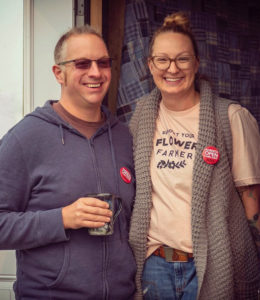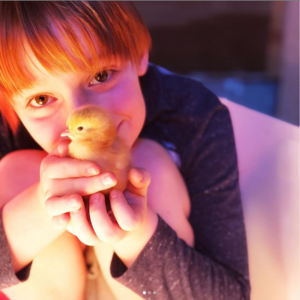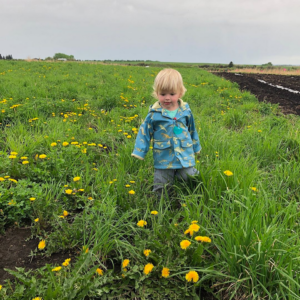Neither my wife Sarah nor I come from a farming background. Quite the contrary. We grew up as city kids, and both worked in the tech sector – Sarah as a meta data keyworder (think digital librarian) in stock photography; myself, for the most part, as a front end web and graphic designer. Both of us were raised to care deeply about the world we live in. Both of us discovered a foodie’s love of food in our early twenties together. So when I was coaxed by some friends to start an urban farm in the spring of 2012, it made a strange fit.
Our first foray into farming was The Tiny Farm Collective, a small urban farm which saw us growing vegetables and selling them at our offices each week. It was a steep learning curve. We really didn’t know what we were doing, and after a couple years we gave up the collective. Our interest, however, persisted, and Sarah and I started Happiness By The Acre, originally an urban farm of about ¼ acre. We eventually bought a good 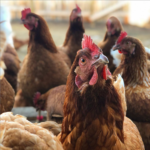 chunk of farm land between Didsbury and Carstairs, Alberta. Over the years we have continued to tackle the steep learning curve in agriculture, holding to a regenerative and land healing paradigm. At this point we have tried a wide range of projects from orchards to market gardens to livestock. In the end we have settled on raising egg laying hens, meat chickens, and working with a neighbour doing custom grazing. After eight years we are finally zeroing in on the type of farm work we enjoy, and systems that really regenerate the land and community.
chunk of farm land between Didsbury and Carstairs, Alberta. Over the years we have continued to tackle the steep learning curve in agriculture, holding to a regenerative and land healing paradigm. At this point we have tried a wide range of projects from orchards to market gardens to livestock. In the end we have settled on raising egg laying hens, meat chickens, and working with a neighbour doing custom grazing. After eight years we are finally zeroing in on the type of farm work we enjoy, and systems that really regenerate the land and community.
Farming is a tough calling. For a start, it’s hard to make a living on a small family farm. Then there are all the ‘uncontrollables’, such as storms, floods, droughts, and the inevitable Alberta hail – which some years seems like the only crop that will grow. The startup costs are high; financially, physically, and emotionally. There are the heartbreaker moments, like the first time we had to euthanize an injured animal or the first time we were witness to the mourning process of a mama cow who had lost her calf. Even after three years with livestock, every time we have to deal with animal injury it is just as hard as the first. Then there are the terrifying moments, like when I gave myself a concussion and fell face first into an electric fence, permanently rewiring my brain and gaining a host of mental and emotional challenges to tackle.
It really begs the question, why do this?
I could write of the sunsets. Of the deep feeling of satisfaction watching the sheer abundance of our pastures. Of how we are binding multiple households of CO2EQs (carbon dioxide equivalents) each year. Of watching our children explore the dirt beneath their feet with their hands, minds, and at times, even their mouths. Farming is deeply gratifying as much as it is deeply challenging. Ultimately the reason why we keep working with our land and livestock is that we feel called to do so.
We talk to a lot of people who feel a great deal of anxiety over finding their calling. This seems to be common in both the faith community and outside of it. It cuts across age groups and generations. What do we do with our lives? What do we chase? Where do we find meaning, or should we seek it at all?
So far, I have never had a clear answer to any of these deep existential and philosophical questions. My nature would never let me distill them down to an answer as singular and simple as “Jesus” or “Money” or “Nothing.”
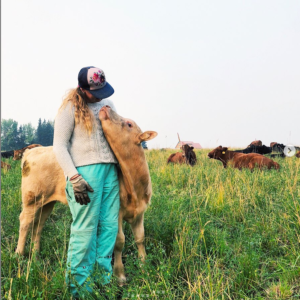 For both Sarah and I, it started long before our faith journey – particularly for me. We were raised on Captain Planet and The Racoons. On the notions that we are better together, and that it is the goal of humanity to become ever more humane. Those ideas were baked into us long before our faith became an active part of our lives. So when it came time to walk towards what called us, it just made sense to do something that healed the earth and stewarded the bounty that we are blessed with. While our faith may not initially have guided us here, it has certainly become the keystone in how we view our challenges and joys.
For both Sarah and I, it started long before our faith journey – particularly for me. We were raised on Captain Planet and The Racoons. On the notions that we are better together, and that it is the goal of humanity to become ever more humane. Those ideas were baked into us long before our faith became an active part of our lives. So when it came time to walk towards what called us, it just made sense to do something that healed the earth and stewarded the bounty that we are blessed with. While our faith may not initially have guided us here, it has certainly become the keystone in how we view our challenges and joys.
We are very lucky to have stumbled into a calling that is rich in meaning. It is hard to bring words to what following our calling to land regeneration feels like. The depth of the feeling is rich and nuanced. It is a gem shot through with challenging imperfections, like insects trapped in amber. The feeling glitters in the sun and reaches skyward to accept the rain. To borrow a term from the faith, it is a feeling of moving towards Shalom. Towards wholeness. Yet never quite reaching it, so there is always more to pursue.
That is what I recommend people look for when they seek their calling. Find that which brings you towards wholeness, and follow where it leads. If you can’t find it, pick a direction that brings benefit to others and the world. If you are going in a direction that makes humanity more humane, you will eventually find your calling. It may be in a slum, or in a board room…or it may be on a farm, watching cattle graze.
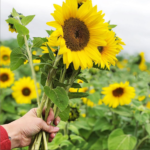 Visit Happiness by the Acre’s website, or follow them on Facebook and Instagram.
Visit Happiness by the Acre’s website, or follow them on Facebook and Instagram.
To find out more about YYC Growers, check out their website and Facebook page.
Photos courtesy of Marcus and Sarah Riedner.


